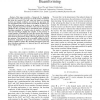Free Online Productivity Tools
i2Speak
i2Symbol
i2OCR
iTex2Img
iWeb2Print
iWeb2Shot
i2Type
iPdf2Split
iPdf2Merge
i2Bopomofo
i2Arabic
i2Style
i2Image
i2PDF
iLatex2Rtf
Sci2ools
143
click to vote
ICASSP
2010
IEEE
2010
IEEE
Circulant space-time codes for integration with beamforming
—This paper provides a framework for designing space-time codes to take advantage of a small number of feedback bits from the receiver. The new codes are based on circulant matrices and simple conditions are derived that guarantee full rate and full diversity. In the absence of feedback, Symbol Error Rate (SER) performance is shown to be similar to that of Diagonal Algebraic Space-Time (DAST) codes, both for Maximum Likelihood (ML) decoding and for suboptimal linear decoding. Decoding complexity of circulant codes is similar to the DAST codes and encoding is slightly less complex. In the presence of a small number of feedback bits from the receiver the circulant construction is shown to permit integration of space-time coding with a fixed set of beams by simply advancing the phase on one of the antennas. This integration is not possible within the DAST framework. Integration of space-time codes with beamforming makes it possible to achieve ML decoding performance with only linear de...
| Added | 06 Dec 2010 |
| Updated | 06 Dec 2010 |
| Type | Conference |
| Year | 2010 |
| Where | ICASSP |
| Authors | Yiyue Wu, A. Robert Calderbank |
Comments (0)

